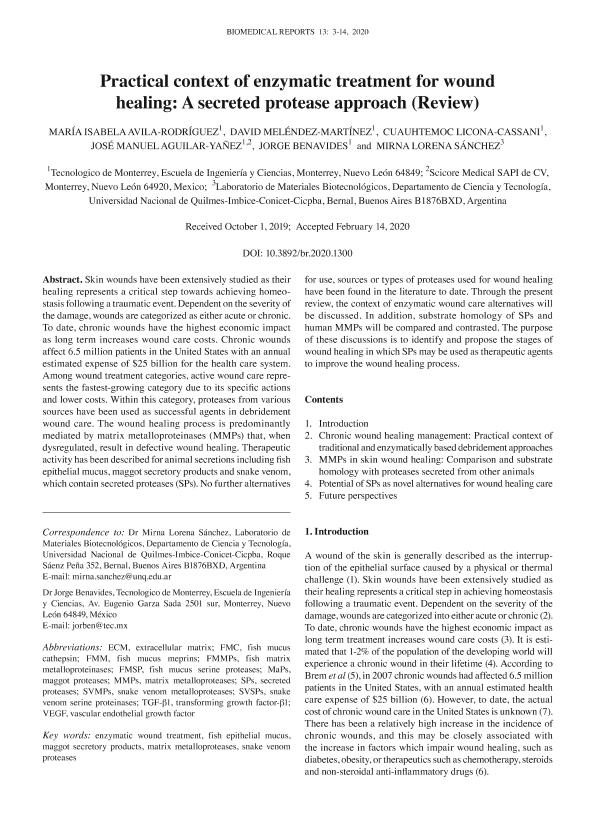Mostrar el registro sencillo del ítem
dc.contributor.author
Avila Rodríguez, María Isabela

dc.contributor.author
Meléndez Martínez, David
dc.contributor.author
Licona Cassani, Cuauhtemoc
dc.contributor.author
Aguilar Yañez, José Manuel
dc.contributor.author
Benavides, Jorge
dc.contributor.author
Sanchez, Mirna Lorena

dc.date.available
2022-04-05T19:55:14Z
dc.date.issued
2020-07
dc.identifier.citation
Avila Rodríguez, María Isabela; Meléndez Martínez, David; Licona Cassani, Cuauhtemoc; Aguilar Yañez, José Manuel; Benavides, Jorge; et al.; Practical context of enzymatic treatment for wound healing: A secreted protease approach (Review); Spandidos Publications; Biomedical Reports; 13; 7-2020; 3-14
dc.identifier.issn
2049-9434
dc.identifier.uri
http://hdl.handle.net/11336/154450
dc.description.abstract
Skin wounds have been extensively studied as their healing represents a critical step towards achieving homeostasis following a traumatic event. Dependent on the severity of the damage, wounds are categorized as either acute or chronic. To date, chronic wounds have the highest economic impact as long term increases wound care costs. Chronic wounds affect 6.5 million patients in the United States with an annual estimated expense of $25 billion for the health care system. Among wound treatment categories, active wound care represents the fastest‑growing category due to its specific actions and lower costs. Within this category, proteases from various sources have been used as successful agents in debridement wound care. The wound healing process is predominantly mediated by matrix metalloproteinases (MMPs) that, when dysregulated, result in defective wound healing. Therapeutic activity has been described for animal secretions including fish epithelial mucus, maggot secretory products and snake venom, which contain secreted proteases (SPs). No further alternatives for use, sources or types of proteases used for wound healing have been found in the literature to date. Through the present review, the context of enzymatic wound care alternatives will be discussed. In addition, substrate homology of SPs and human MMPs will be compared and contrasted. The purpose of these discussions is to identify and propose the stages of wound healing in which SPs may be used as therapeutic agents to improve the wound healing process.
dc.format
application/pdf
dc.language.iso
eng
dc.publisher
Spandidos Publications

dc.rights
info:eu-repo/semantics/openAccess
dc.rights.uri
https://creativecommons.org/licenses/by-nc-nd/2.5/ar/
dc.subject
WOUND-HEALING
dc.subject
FISH-EPITHELIAL-MUCUS
dc.subject
METALLOPROTEASES
dc.subject
PROTEASES
dc.subject.classification
Tecnologías que involucran la identificación de ADN, proteínas y enzimas, y cómo influyen en el conjunto de enfermedades y mantenimiento del bienestar

dc.subject.classification
Biotecnología de la Salud

dc.subject.classification
CIENCIAS MÉDICAS Y DE LA SALUD

dc.title
Practical context of enzymatic treatment for wound healing: A secreted protease approach (Review)
dc.type
info:eu-repo/semantics/article
dc.type
info:ar-repo/semantics/artículo
dc.type
info:eu-repo/semantics/publishedVersion
dc.date.updated
2021-09-06T17:27:04Z
dc.identifier.eissn
2049-9442
dc.journal.number
13
dc.journal.pagination
3-14
dc.journal.pais
Grecia

dc.description.fil
Fil: Avila Rodríguez, María Isabela. Instituto Tecnologico de Monterrey. Escuela de Ingenieria y Ciencias.; México
dc.description.fil
Fil: Meléndez Martínez, David. Instituto Tecnologico de Monterrey. Escuela de Ingenieria y Ciencias.; México
dc.description.fil
Fil: Licona Cassani, Cuauhtemoc. Instituto Tecnologico de Monterrey. Escuela de Ingenieria y Ciencias.; México
dc.description.fil
Fil: Aguilar Yañez, José Manuel. Instituto Tecnologico de Monterrey. Escuela de Ingenieria y Ciencias.; México. Scicore Medical SAPI de CV; México
dc.description.fil
Fil: Benavides, Jorge. Instituto Tecnologico de Monterrey. Escuela de Ingenieria y Ciencias.; México
dc.description.fil
Fil: Sanchez, Mirna Lorena. Consejo Nacional de Investigaciones Científicas y Técnicas. Centro Científico Tecnológico Conicet - La Plata. Instituto Multidisciplinario de Biología Celular. Provincia de Buenos Aires. Gobernación. Comisión de Investigaciones Científicas. Instituto Multidisciplinario de Biología Celular. Universidad Nacional de La Plata. Instituto Multidisciplinario de Biología Celular; Argentina
dc.journal.title
Biomedical Reports
dc.relation.alternativeid
info:eu-repo/semantics/altIdentifier/url/http://www.spandidos-publications.com/10.3892/br.2020.1300
dc.relation.alternativeid
info:eu-repo/semantics/altIdentifier/doi/http://dx.doi.org/10.3892/br.2020.1300
Archivos asociados
